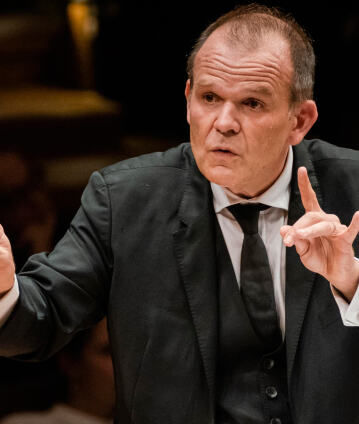A “French Evening” with François-Xavier Roth and Anna Caterina Antonacci

A diverse cross-section of three centuries of French music is on offer at this concert from December 2015 – from the Baroque master Jean-Baptiste Lully to Claude Debussy, Maurice Ravel and Edgard Varèse. The Italian soprano Anna Caterina Antonacci sings in Hector Berlioz’s sensuous Nuits d’été. With this programme, conductor François-Xavier Roth makes his debut with the Berliner Philharmoniker.
Jean-Baptiste Lully, who was born in Florence in 1632 as Giovanni Battista Lulli and later adopted France as his home, had a lasting influence on the musical life of the Grande Nation as the founder of the Tragédie en musique – the French counterpart to Italian opera seria. But it was not only rival gods and tragic heroes of antiquity that Lully revived with his music. The composer also lent his voice to the bourgeoisie, still young at that time. To this end he thought up another form of musical theatre with none other than Molière: the so-called comédie-ballet. This Gesamtkunstwerk consisting of music, language and dance culminated in Le Bourgeois gentilhomme, the last collaboration between Lully and Molière.
Hector Berlioz invented another musical genre two centuries later more or less en passant: the orchestral song. Between 1834 and 1838 the composer set six poems by his compatriot Théophile Gautier to music; in 1856 he combined these songs and published them under the title Les Nuits d’été with orchestral accompaniment – a first, and not only in French music history. Whereas Berlioz was considered a revolutionary of French music of the 19th century, Claude Debussy and Maurice Ravel set new accents at the turn of the century. For many classical music lovers, the catchword “Impressionism”, borrowed from painting, under which the music of these two composers was conflated early on, has become a synonym for French music.
One of the most original composers of the following generation was Edgard Varèse, who emigrated after the outbreak of the First World War from his home in France to the USA. He earned a name for himself in particular by emancipating noise in music; his Ionisation for 13 percussionists makes an effective opening to the evening. This little stroll through the rich innovations of French music is conducted by François-Xavier Roth, born in Neuilly-sur-Seine in 1971. Acting music director of the SWR Sinfonieorchester Baden-Baden and Freiburg as well as designated general music director of the city of Cologne, Roth makes his debut as conductor of the Berliner Philharmoniker at this concert. The interpreter of the Nuits d’été, Italian soprano Anna Caterina Antonacci, also appears with the Philharmoniker for the first time.
© 2015 Berlin Phil Media GmbH
Related interviews